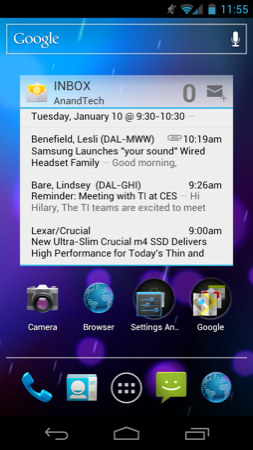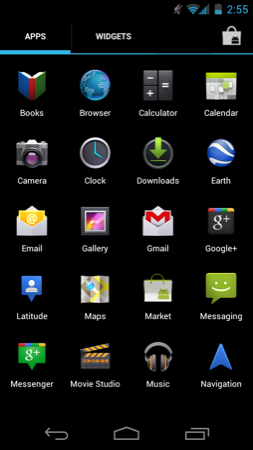Samsung Galaxy Nexus & Ice Cream Sandwich Review
by Brian Klug & Anand Lal Shimpi on January 18, 2012 1:34 PM ESTGoogle employs more than 20,000 people worldwide and the number of them working on Android are in the single digit percentage range. Google's business is search, but it has always had aspirations of more. Android isn't just a chance to capitalize on mobile search for Google, it's also an opportunity to grab power in the next era of personal computing. If you believe that smartphones will eventually replace mainstream PCs, who wouldn't want to be to smartphones what Microsoft was to PCs in the early 1990s?
Previous versions of Android have been cautious, evolutionary steps along a path to being a more open/flexible alternative to iOS. Starting with Honeycomb (Android 3.0) however, Google began to step out of the shadow of its competitors and really start to define Android as a mobile computing platform. Honeycomb was limited to tablets but its successor, Ice Cream Sandwich (Android 4.0), would bring unification to Android across both tablets and smartphones.
Today we look at both ICS and its launch vehicle, Google's Galaxy Nexus.
The Android vs. iOS Debate
It's very clear to me now more than ever that Apple and Google have completely different goals with their mobile OS strategies. Excluding the unclear strategy behind Chrome OS, Android is pretty much Google's primary operating system. The unified tablet/smartphone strategy behind Ice Cream Sandwich makes sense because for Google to succeed in the OS business it needs to deploy Android on everything from smartphones to notebooks. We've already seen the strengths in having a smartphone platform with a strong app ecosystem. Things become even more appealing if you have a phone, tablet and PC that all run the same OS and apps. As Android is Google's one-size-fits-all operating system, it needs to have a broader and slightly more ambitious focus than iOS otherwise it risks losing the race in the long run.
Apple is in a different position. It already has a successful desktop/notebook OS that is continuing to grow. While iOS has been a runaway success for Apple, the Mac OS X platform is a solid option for any user who needs more than their iPhone or iPad can provide. The two OSes may converge or at least borrow heavily from one another, but in the interim they can remain independent. If you need more of a computing experience Apple is happy to sell you a Mac. If you want the it-just-works appliance experience in your phone or tablet, Apple has a whole bunch of iPhone/iPad configurations to offer you.


ICS isn't a step towards iOS. If anything it proves that Google is committed to its own trajectory. Android is an OS that, although more closed than many would like, still allows more flexibility than iOS. You can sideload apps not purchased in the Market. The file system isn't completely hidden from you. You can even override the default zoom level on web pages. Apple and Google both pour tons of time and research into figuring out the best way to do something. And, to be honest, I feel like Apple generally does a better job of "getting it" for the very mainstream consumer. Rather than attempt to make the perfect mold however, Google gives you one that's a bit more flexible.
I've said this before but I do believe that Apple is trying to deliver more of an appliance experience, whereas Google is providing you with a modern take on a traditional computing experience. If the appliance is a smartphone, then both approaches are equally capable - it's just a matter of personal preference.
What's new in ICS really falls into one of three categories:
- Improvements in UI frame rate due to OpenGL ES rendering (non-skia) path
- UI tweaks
- New features
Nowhere in this list is a fundamental change in the way Android works. I feel that this is a very important point to understand and likely the cause for lots of disagreement when it comes to just how impressive (or not) ICS is.
ICS is smoother, more polished and has its own set of new features that make it a significant step forward for Android. What ICS is not however is an outright clone of iOS. If you prefer the iOS experience to Android, ICS will do nothing to change your opinion. If all you were missing from Android was a smoother UI, then its fourth major release should be almost everything you could ask for.










185 Comments
View All Comments
HooDooMagic - Friday, January 20, 2012 - link
I think it's already been mentioned that 4.03 fixed the task switcher lag. I have alpha ICS 4.03 roms running on a Nexus One, Nook Color and Samsung Galaxy Tab 10.1 and everything runs very smoothly on all 3 devices. Even the very underpowered Nook has surprisingly little lag and stutter when using the task switcher and transitioning between screens/app drawer etc.Chloiber - Wednesday, January 18, 2012 - link
The Galaxy Nexus is a very nice phone indeed, but there are just some things that I don't like about it. As mentioned in the review, the GPU is not the best, which is actually the main reason I won't buy the phone. I buy smartphones which should last about 2 years. Buying one with a GPU from the beginning of last year is just not good enough. As Anand mentions: better wait for Q2, maybe Q3. At the moment, the GN is certainly the best phone (in my opinion) money can buy, but it's not the right moment to buy an android phone.The review is very late indeed...but very thorough - thank you!
One question remains: are microSD slots a thing of the past? Google mentioned that there is a good reason why they didn't include one (slow speeds for apps). But I still think that's a very bad reason not to include a slot. While it is true, that the mSD cards are pretty slow compared to internal storage, there is just no way in hell I'm gonna pay 100$+ for 16GB of additional internal NAND. Additionally, you don't need high speeds for music, pictures and movies (the main reason to get an SD card).
I hope for a phone in Q2/Q3 with a) better SoC, b) an SD card slot and c) a 720p IPS or SAMOLED+ screen.
humancyborg - Wednesday, January 18, 2012 - link
I agree. The GPU is a terrible oversight on this phone, particularly considering the inclusion (finally) of OpenGL rendering throughout Android.With the 4S GPU being 3-4x faster it's tough to see how this phone is going to stand the test of time. Presumably the iPad3 and next iPhone will be packing an even more powerful SoC and GPU.
This is one of the main reasons that I think Apple is in a great position going forward with regards to hardware. With the exception of Samsung, everyone else is relying on TI, Qualcomm, Intel, etc to make the right decisions with regards to CPU/GPU etc combination and clearly those chip makers do not always have the best insight with regards to product pipeline or requirements.
A retina display-ish version of the iPad is going to take a GPU far beyond anything the current SoC guys are manufacturing.
tipoo - Wednesday, January 18, 2012 - link
The next generation of PowerVR SGX graphics chips are supposedly 20x as powerful as the current ones. I'm guessing Apple will still be using the dual core variant of the 6** series. That's good, if the 4x screen resolution rumours are true.Yeesh, Android devices still haven't caught up to the old GPU now a new one is around the corner. Nvidia is stuck with their own GPU's of course, but TI or Samsung should switch to PowerVR if this performance domination continues.
trob6969 - Wednesday, January 18, 2012 - link
What performance domination?! Android phones are easily the most powerful on the market!Greg512 - Wednesday, January 18, 2012 - link
Not when it comes to GPU power. The iPhone 4S has a GPU 3-4 times as powerful as the one in the Nexus. Android phones do tend to have higher clocked processors, however, so they do have a healthy advantage on that front. Android phones also have more RAM, though many would debate that iOS is memory efficient, negating the hardware advantage.KoolAidMan1 - Wednesday, January 18, 2012 - link
You're kidding, right? The Tegra 3 is slower than the eight month old A5. Everything in Android world is playing catch-up with old parts, which is odd given that they have a more frequent upgrade cycle. Problem is that they've been behind since the beginning.doobydoo - Thursday, January 19, 2012 - link
trob6969 - the leading Android phones have CPU's which are largely comparable to the CPU in the iPhone 4S - in some cases they even boast up to ~10% extra performance (as a result of, in some cases, 50% higher clock speed), but only in CPU limited tasks, and that <10% is barely noticeable.Graphically, the GPU in the Nexus Prime is far slower than even the Samsung Galaxy S2 - using an older GPU which is up to 3x slower than the GPU in the iPhone 4S. The GPU in the SG2 (the fastest Android GPU) is also far slower than the iPhone 4S (as the benchmarks in this review show)
Because iOS is hardware accelerated (and tightly intertwined with the iPhone), the performance of the iPhone 4S and iOS is far superior to any Android phone out at this moment in time.
zorxd - Thursday, January 19, 2012 - link
uh?50% faster clock speed gives you 50% more performance in CPU limited tasks. Don't forget that it's the same architecture (Cortex A9).
I hope you are not making that 10% claim based on javascript bencmarks. They are browser benchmarks more than CPU benchmarks.
Zoomer - Thursday, January 19, 2012 - link
Not really, the A9 ISA have many different architecture implantations. TI does their own, Apple probably did their own, and I believe nVidia has their own too.